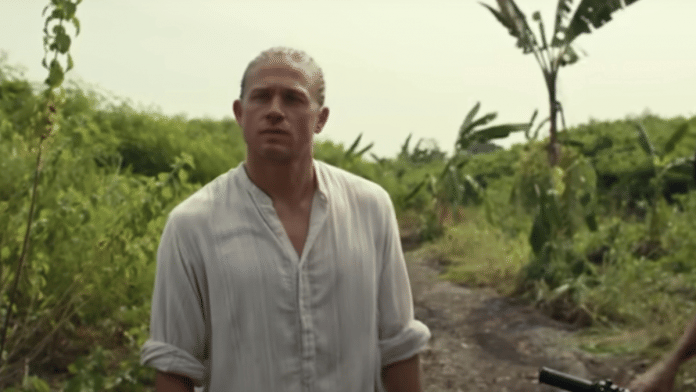It took me a long time and some hard lessons to learn what I know about love, fate and chasing redemption. That story saw me beaten, loved, befriended and chained on three continents. But it started with a simple choice, escape or die,” said a hardened Dale, played by Charlie Hunnam, as he narrated his experience of escaping an Australian prison.
This is how Apple TV+’s new series Shantaram kicks off, with the first narration line lifted and altered from the first sentence of Gregory David Roberts’ 2003 novel on which it is based. The show centres on Dale, an Australian bank robber who was arrested in connection with the murder of a police officer. But he breaks out of prison and seeks freedom in Bombay in 1982, under a New Zealander alias named Lindsey Ford, or Lin.
The thrilling but somewhat cliched prison break scenes are quickly replaced by the standard, panning drone shots of Bombay slums and crowded buses juxtaposed with the luxury surrounding Marine Drive.
At this point, it would be understandable to be concerned that this latest Australian production, set and filmed around Bombay, will fall victim to the same Western gaze and white saviour tropes that have doomed many productions in the past.
Also read: Netflix’s Blonde isn’t Oscar-bait biopic, but uses Marilyn Monroe fiction to skewer Hollywood
Except for one crucial element — Gregory David Roberts’ source material is semi-autobiographical, or at least he claims it is. And that seems to be more than enough for head writers Eric Warren Singer and David Lightfoot, as well as director Bharat Nalluri, to draw from when it comes to adding sensitivity and authenticity to this Western gaze.
From the fake Farz Aur Kanoon (1982)-inspired film poster plastered on the front wall of Dale/Lin’s hotel room to the many scenes taking place in the Leopold substitute, Reynaldo’s, the production team as well as cinematographer Stefan Duscio meticulously paint a compelling picture of Bombay by dressing it up in a pre-economic liberalisation aesthetic.
Fortunately, the series’ merits so far don’t just rest on the big Paramount-Apple budget and on-location shoots, as the cast performs admirably across the board. Majority of the British and Australian actors of Indian descent do the hard yards of world building as extras and peripheral characters, while Shubham Saraf does magnificently in the meatiest Indian role, as Prabhu, a tourist guide who starts out as a confidence-trickster tour guide but develops a meaningful friendship with Lin.
Series star Charlie Hunnam has often struggled as a leading man in previous Hollywood productions, particularly in terms of box office draw. As such, even a basic task like hiding his native Geordie accent appeared to have been a challenge, especially when he was criticised by some for his unconvincing speech patterns in Sons of Anarchy and Pacific Rim. But here, Hunnam comes to the party in a big way, even finding humour by portraying Lin as a polyglot as well as an expert impersonator of accents.
While the series’ early episodes are strongest when they simply allow conversations to play out and the actors to develop chemistry accordingly, it is hamstrung by Hunnam’s humdrum narration, which is overly faithful to the source material’s style.
At first, it made sense, as a nod to longtime fans of the novel and an explanation of the premise in the first episode. But often, it doesn’t leave you with enough room for interpretation and even unnecessarily breaks from important, intense scenes, such as when Lin nearly came to blows with Italian criminal Maurizio, played effectively by Luke Pasqualino of Skins fame.
Also read: ‘Greatest Beer Run Ever’ is a preachy but enjoyable trip to a Saigon theka during Vietnam War
Shantaram had a protracted, troubled production at times, due to delays caused by the COVID-19 pandemic as well as Singer quitting as showrunner midway through and Lightfoot taking his place. That may possibly explain some of the inconsistencies in writing quality, as the series occasionally oscillates between slow burn brilliance and forgettable mediocrity.
Overall, Shantaram takes a largely unknown cast and uses them excellently to create a gripping, if slightly flawed, period piece adaptation of Roberts’ seminal work, perhaps thanks to Bharat Nalluri’s direction keeping things mostly streamlined from a technical standpoint.
(Edited by Tarannum Khan)






